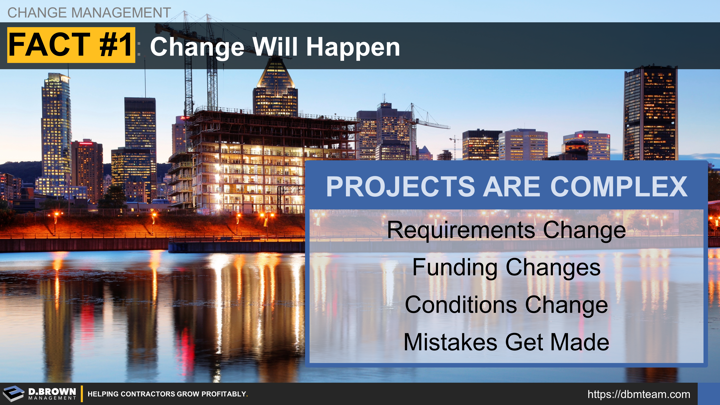Mistakes will be made. It is how the collective project team manages these changes that ultimately determines success at all levels, including customer satisfaction, quality, and financial.
Changes in construction are not problems. They are facts that must be coped with over time. Studies show that on average, about 10 percent of the project budget will go toward changes, some large and many small.
Projects are complex and that complexity continues to increase.
- Project owners need to leverage the latest building materials and methods.
- Projects are frequently being built with tighter schedules and on tighter sites.
- Construction technology continues to evolve, creating many opportunities but also increasing complexity.
- Safety standards continue to evolve, including our response to COVID-19.
- Quality and tolerances continue to improve. Regulations and compliance requirements continue to increase.
- Projects require tens, hundreds, and sometimes thousands of people with wide-ranging skills all working together.
- Ultimately, the project owner needs their project delivered to satisfy their customers and keep growing their business, all within a budget.
Requirements will likely change as the project evolves. The more complex the project and the longer the schedule, the more likely the requirements will change.
- The project owner's business may change and require more, less, or different capacity from the project.
- Products, materials, and methods may change.
Conditions will likely change once the projects starts.
- The site or remodel conditions may not be as assumed.
- Weather conditions may be out of the ordinary.
- Labor quality and quantity may not go as planned.
- Regulations may change.
Mistakes will get made.
- We are all human and no process will create perfect quality control.
- Complexity adds opportunities for mistakes at an exponential rate.
These are just facts. Change will happen. Not passing the cost of the change to the customer is a decision, but that decision does not mean that changes aren't happening. That only means that contingencies for changes were either built into the pricing to begin with or the contractor is choosing to lower their originally planned margin.
Great preconstruction services, project planning, and project management will mitigate many changes, but remember that a change is any deviation from the planned execution of the project.
Project delivery methods like CM-at-Risk or Integrated Project Delivery can minimize changes.

